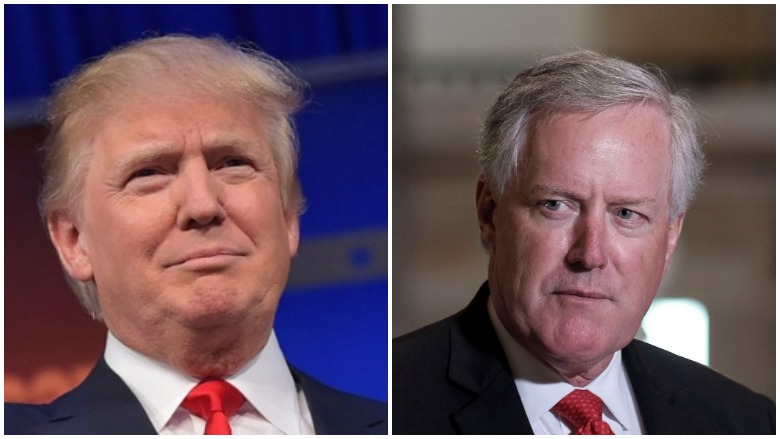
Getty President Donald Trump (left) and Chief of Staff Mark Meadows (right).
From the 2020 presidential election to arguments over which party should be allowed to fill the Supreme Court seat left vacant by the death of Justice Ruth Bader Ginsburg, President Donald Trump and Democrats have not agreed on much.
However, House Speaker Nancy Pelosi and Trump both agree that they want to provide Americans with more stimulus checks. Nexstar Media Wire reported that Pelosi and Treasury Secretary Steven Mnuchin spoke on the phone on September 16 to discuss restarting negotiations and both sides considered the Problem Solvers Caucus’ bipartisan framework progress.
But hangups about the national debt may be holding many Senate Republicans back on supporting a coronavirus relief package that includes more stimulus checks.
Here’s what you need to know:
Trump & the Democrats Want Stimulus Checks in a Bill
In early September, Vice President Mike Pence noted that Trump was in favor of more payments. According to CNBC, Pence said, “Nobody wants to give direct payments to American families more than President Donald Trump … It helped people through this tough time.” Trump also floated using money from the coronavirus relief fund to send payments directly to Americans at a White House briefing. During another White House press briefing on September 16, Trump said, “I want to see people get money. … I’d like to see the larger number. Yeah, I would like to see it.”
Stimulus check payments were included in the $3 trillion HEROES Act, which has been sitting on Senate Majority Leader Mitch McConnell’s desk since it passed the Democratic-controlled House in May. In a joint statement released September 8, Senate Democratic Leader Chuck Schumer and Pelosi slammed McConnell for the lack of stimulus checks, airline support, election security and other measures in a recent “skinny bill” that McConnell introduced to the Senate.
In May, the House passed the $3 trillion HEROES Act, and later in May, Republicans introduced the $1 trillion HEALS Act. Since then, Pelosi has offered to trim the Democrats’ bill by $800 billion while Republicans moved their estimate up by $300 billion, but neither side has been able to close the gap between $2.2 trillion and $1.3 trillion. Pelosi told White House Chief of Staff Mark Meadows that Democrats would not budge from their number during an August 27 phone call, according to Forbes.
Republicans Point to Deficit Spending to Explain Hesitance on Stimulus Checks & a Pricier COVID-19 Relief Bill
The national debt has ballooned under the Trump administration; when Obama left office, the debt was $19.9 trillion, according to The Balance, and it currently sits at nearly $27 trillion under Trump, according to the debt clock.
The Hill reported that Meadows, the co-founder of the Republican Freedom Caucus and a well-known fiscal hawk, has been adamant about not increasing the debt, and McConnell said in July that 20 out of 53 Republican senators would be likely to vote against coronavirus measures that would increase the debt. Nexstar Media Wire reported that Kentucky Senator Rand Paul opposed the Republicans’ cheapest stimulus bill — a $500 billion proposal — because of how it would affect the debt.
In response to concerns about the debt, White House Press Secretary Kayleigh McEnany said, “the debt is a big second-term priority” for Trump, according to The Hill.
Republicans also have an ideological perspective on stimulus checks. The New York Times reported that Republicans have traditionally disliked stimulus packages and they refused to support the $825 billion stimulus package President Barack Obama proposed in 2009 in the wake of the economic recession.
The Wall Street Journal reported that a conservative advocacy group called “The Club for Growth” has criticized any Republican senators who voice support for another stimulus bill. The Club’s president, David McIntosh, said, “And we’re saying very publicly now that if McConnell has his way, that Republicans will lose, that he will have led the Republicans into the minority in the Senate…Voters will say, ‘Why elect Republicans when we can get Democrats to give us handouts?’”
The combination of this ideological resistance to “handouts” and an increasing deficit manifested in Republican ambivalence about extending the $600 unemployment benefits. Mnuchin has been unyielding in saying he doesn’t want to produce more of the benefits, saying, “It just wouldn’t be fair to use taxpayer dollars to pay more people to sit home than they would, working and get a job,” according to The Hill.
As Next City reported, despite accusations that the funds were making unemployed and underemployed Americans lazy, a Yale study noted that those who could return to work were doing so in vast numbers. In addition, Republicans have been less resistant to other factors that have increased the deficit. For example, the Tax Cuts and Job Act — which Meadows voted for — increased the national debt by $1.9 trillion, according to the Brookings Institution.
The U.S. Congressional Budget Office reported in September that the federal debt is projected to exceed 100% of GDP in 2021 and the federal budget deficit is at $3.3 trillion. When Obama left office in January of 2017, the Budget Office reported that the deficit was $559 billion.
READ NEXT: Here’s When All 50 States Plan to Distribute LWA Unemployment Payments